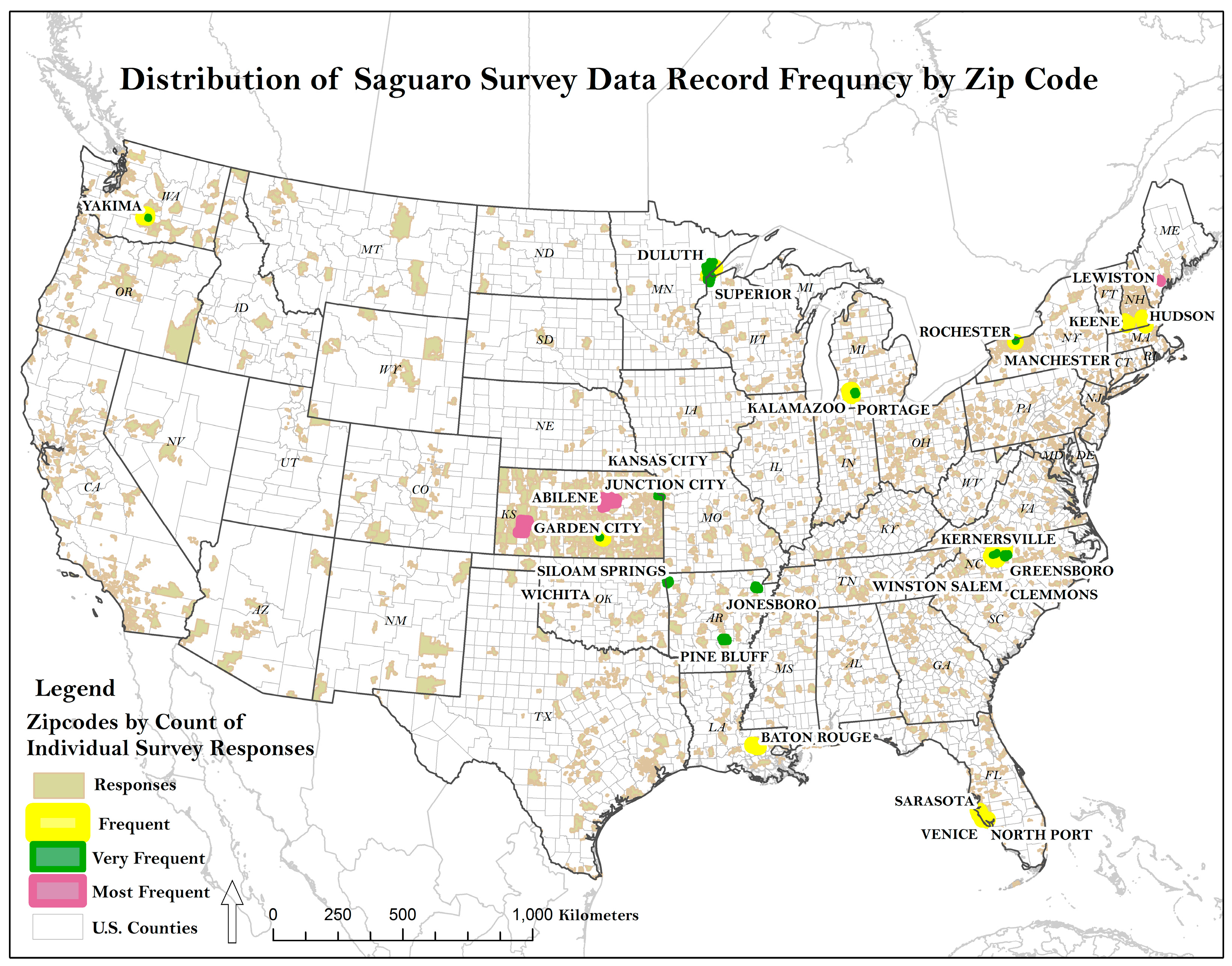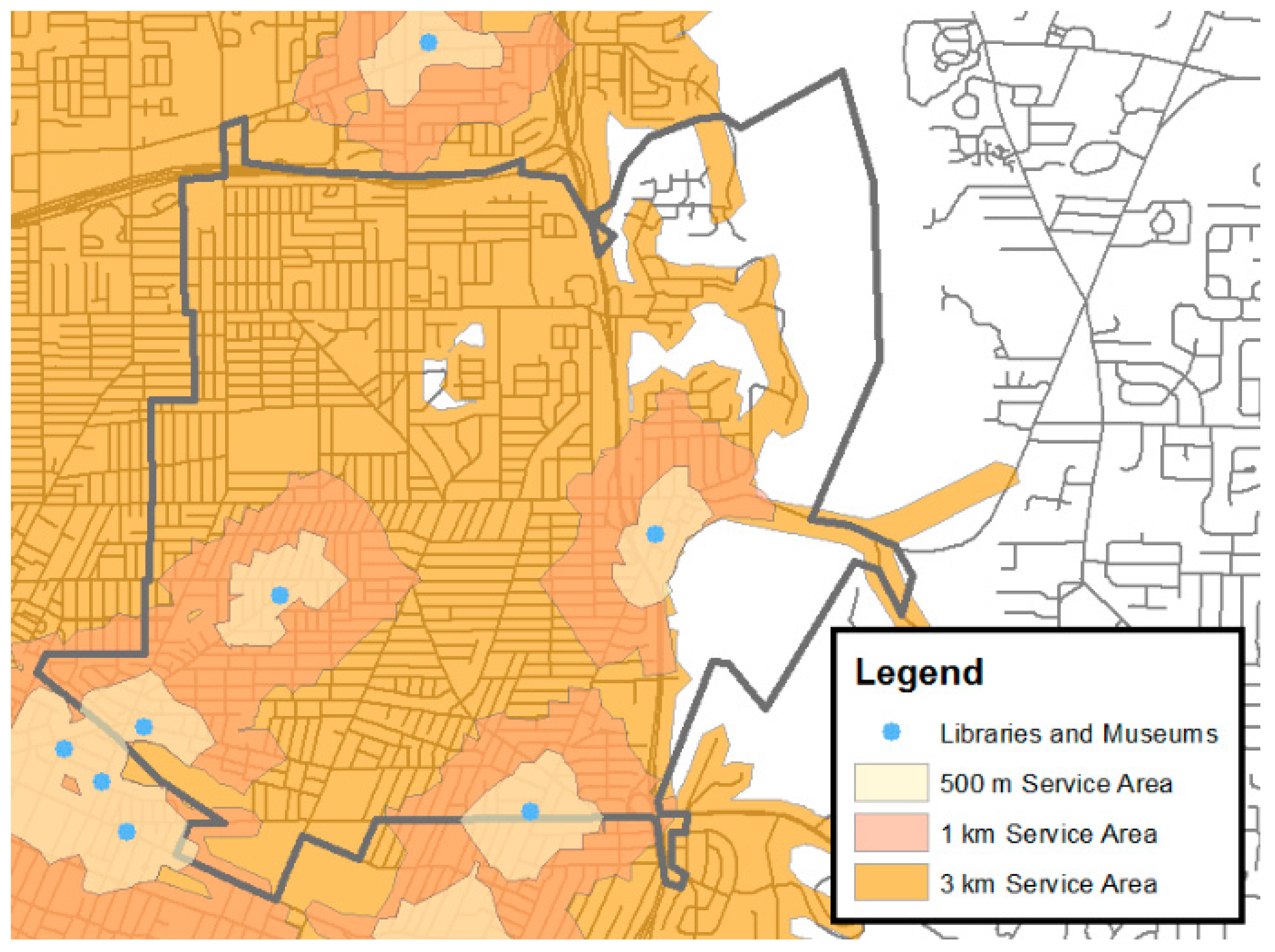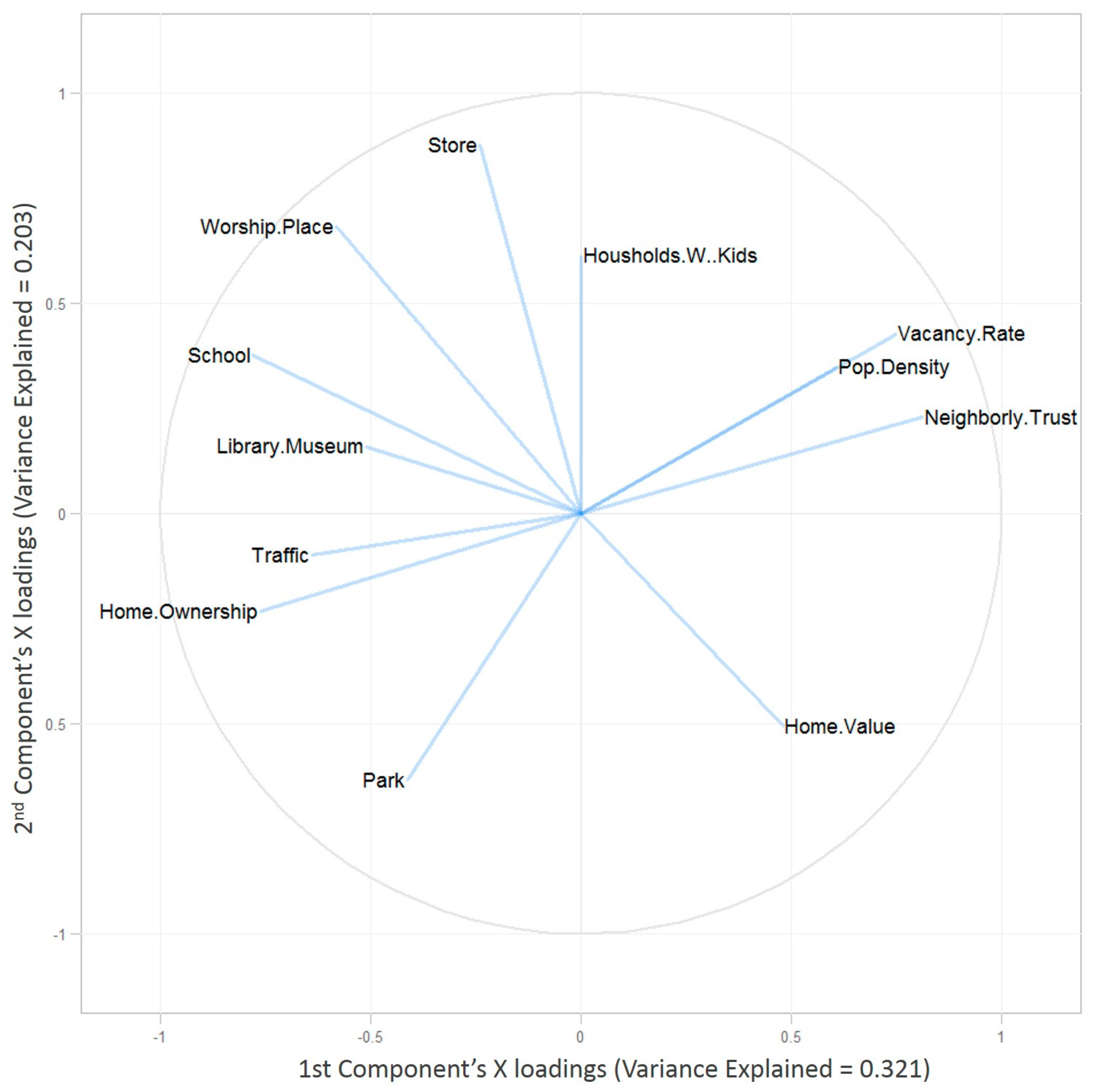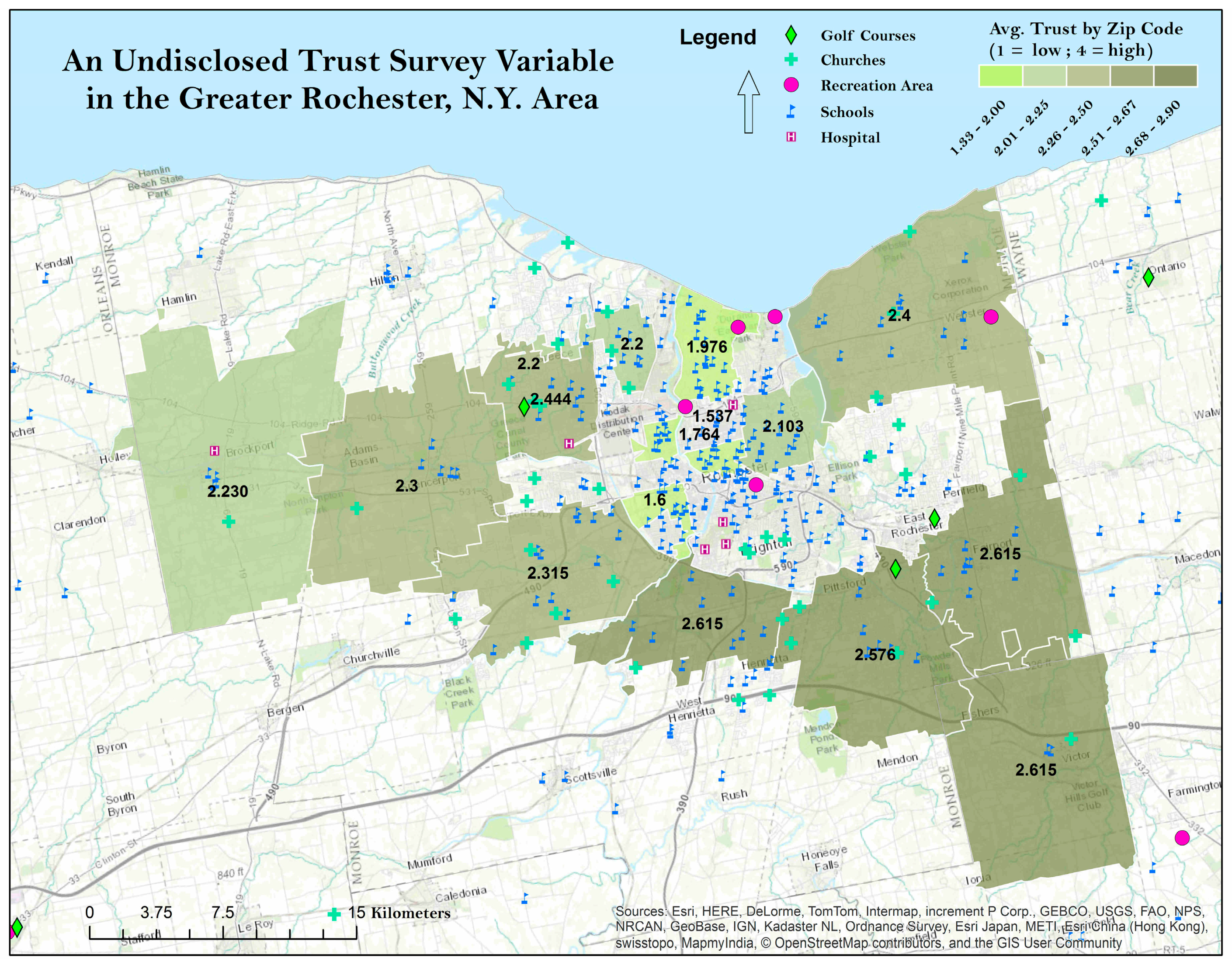A Geographic Information System (GIS)-Based Analysis of Social Capital Data: Landscape Factors That Correlate with Trust
Abstract
:1. Introduction
1.1. Background
1.1.1. The Spatial Side of Social Capital
1.1.2. Street Condition and Spatial Quality
1.1.3. Housing Conditions and Residential Building Arrangement
1.1.4. Land Use and Macroscale Factors
1.1.5. Urban Form and Spatiality
2. Materials and Methods
2.1. Data
2.1.1. Social Capital Benchmark Community Survey Data
2.1.2. Trust
- Would you say that most people can be trusted or that you can’t be too careful in dealing with people? (people can be trusted, you can’t be too careful, depends (volunteered information))
- How much you can trust people in your neighborhood (a lot (coded as 1), some (2), a little (3), not at all (4), does not apply (volunteered information) (5), don’t know (8), refused (9))
- How about white people? (same as neighborhood)
- What about African Americans or blacks? (same as neighborhood)
- What about Asian people? (same as neighborhood)
- How about Hispanics or Latinos? (same as neighborhood)
2.1.3. Ancillary Data
2.2. National Study
2.3. Rochester, NY Analysis
3. Results
3.1. National-Level Results: The Effect of Landscape on Trust
3.2. Rochester, New York Case Study
4. Discussion and Conclusions
Acknowledgments
Author Contributions
Conflicts of Interest
References
- Jackman, R.W.; Miller, R. Social capital and politics. Annu. Rev. Political Sci. 1998, 1, 47–73. [Google Scholar] [CrossRef]
- Portes, A.; Sensenbrenner, J. Embeddedness and immigration—Notes on the social determinants of economic-action. Am. J. Sociol. 1993, 98, 1320–1350. [Google Scholar] [CrossRef]
- Woolcock, M. Social capital and economic development: Toward a theoretical synthesis and policy framework. Theory Soc. 1998, 27, 151–208. [Google Scholar] [CrossRef]
- Adler, P.; Kwon, S. Social Capital: Prospects for a new concept. Acad. Manag. Rev. 2002, 27, 17–40. [Google Scholar]
- Coleman, J.S. Social capital in the creation of human capital. Am. J. Sociol. 1988, 94, S95–S120. [Google Scholar] [CrossRef]
- Geertz, C. The rotating credit association: A “middle rung” in development. Econ. Dev. Cult. Chang. 1962, 10, 241–263. [Google Scholar] [CrossRef]
- Ouchi, W.G. Markets, bureaucracies, and clans. Adm. Sci. Q. 1980, 25, 129–141. [Google Scholar] [CrossRef]
- Nelson, R.E. The strength of strong ties: Social networks and intergroup conflict in organizations. Acad. Manag. J. 1989, 32, 377–401. [Google Scholar] [CrossRef]
- Uzzi, B. Social structure and competition in interfirm networks: The paradox of embeddedness. Adm. Sci. Q. 1997, 42, 35–67. [Google Scholar] [CrossRef]
- Granovetter, M.S. The strength of weak ties. Am. J. Sociol. 1973, 78, 1360–1380. [Google Scholar] [CrossRef]
- Krackhardt, D.; Hanson, J.R. Informal networks: The company. Harv. Bus. Rev. 1993, 71, 104–111. [Google Scholar] [PubMed]
- Knack, S.; Keefer, P. Does social capital have an economic payoff? A cross-country investigation. Q. J. Econ. 1997, 112, 1251–1288. [Google Scholar] [CrossRef]
- Kawachi, I.; Kennedy, B.P.; Lochner, K.; Prothrow-Stith, D. Social capital, income inequality, and mortality. Am. J. Public Health 1997, 87, 1491–1498. [Google Scholar] [CrossRef] [PubMed]
- Clark, A.K. Rethinking the decline in social capital. Am. Politics Res. 2015, 43, 569–601. [Google Scholar] [CrossRef]
- Fukuyama, F. Social capital and the global economy. Foreign Aff. 1995, 74, 89–103. [Google Scholar] [CrossRef]
- Putnam, R. Social capital: Measurement and consequences. Can. J. Policy Res. 2001, 2, 41–51. [Google Scholar]
- Wilson, H. Parental supervision re-examined. Br. J. Criminol. 1987, 27, 275–301. [Google Scholar] [CrossRef]
- Wilkinson, R.G. Unhealthy Societies: The Afflictions of Inequality; Routledge: London, UK, 2002. [Google Scholar]
- Paxton, P. Is social capital declining in the United States? A multiple indicator assessment. Am. J. Sociol. 1999, 105, 88–127. [Google Scholar] [CrossRef]
- Uslaner, E.M. Producing and consuming trust. Political Sci. Q. 2000, 115, 569–590. [Google Scholar] [CrossRef]
- Thomas, C.Y. Capital markets, financial markets and social capital: An essay on economic theory and economic ideas. Soc. Econ. Stud. 1996, 45, 1–23. [Google Scholar]
- Inglehart, R. Modernization and Postmodernization: Cultural, Economic, and Political Change in 43 Societies; Cambridge University Press: Cambridge, UK, 1997. [Google Scholar]
- Burt, R.S. Structural Holes: The Social Structure of Competition; Harvard University Press: Cambridge, MA, USA, 1992. [Google Scholar]
- Coleman, J.S. Foundations of Social Theory; The Belknap Press of Harvard University: Cambridge, MA, USA, 1990. [Google Scholar]
- Putnam, R.D. Bowling alone: America’s declining social capital. J. Democr. 1995, 6, 65–78. [Google Scholar] [CrossRef]
- Pretty, J. Social capital and the collective management of resources. Science 2003, 302, 1912–1914. [Google Scholar] [CrossRef] [PubMed]
- Abrams, R.F.; Malizia, E.; Wendel, A.; Sallis, J.; Millstein, R.A.; Carlson, J.A.; Cannuscio, C.; Glanz, K.; Samet, J.; Sleet, D.A.; et al. Making Healthy Places: Designing and Building for Health, Well-Being, and Sustainability; Island Press: Washington, DC, USA, 2012. [Google Scholar]
- Selman, P. Social capital, sustainability and environmental planning. Plan. Theory Pract. 2001, 2, 13–30. [Google Scholar] [CrossRef]
- Bebbington, A. Social capital and rural intensification: Local organizations and islands of sustainability in the rural Andes. Geogr. J. 1997, 163, 189–197. [Google Scholar] [CrossRef]
- Dale, A.; Newman, L. Social capital: A necessary and sufficient condition for sustainable community development? Community Dev. J. 2010, 45, 5–21. [Google Scholar] [CrossRef]
- Portes, A. Downsides of social capital. Proc. Natl. Acad. Sci. USA 2014, 111, 18407–18408. [Google Scholar] [CrossRef] [PubMed]
- Irem, Ö.Z. Spatial representations of ideology and politics in urban scene: Keçiören example. J. Ank. Stud. 2014, 2, 131–158. [Google Scholar]
- Oliver, J.E. Democracy in Suburbia; Princeton University Press: Princeton, NJ, USA, 2001. [Google Scholar]
- Rodin, J. Density, perceived choice, and response to controllable and uncontrollable outcomes. J. Exp. Soc. Psychol. 1976, 12, 564–578. [Google Scholar] [CrossRef]
- Mehta, V. Lively Streets: Determining Environmental Characteristics to Support Social Behavior. J. Plan. Educ. Res. 2007, 27, 165–187. [Google Scholar] [CrossRef]
- Abu-Ghazzeh, T.M. Housing layout, social interaction, and the place of contact in Abu-Nuseir, Jordan. J. Environ. Psychol. 1999, 19, 41–73. [Google Scholar] [CrossRef]
- Hester, R.T. Planning Neighborhood Space with People; Van Nostrand Reinhold: New York, NY, USA, 1984. [Google Scholar]
- Appleyard, D. Livable streets: Protected neighborhoods? Ann. Am. Acad. Pol. Soc. Sci. 1980, 451, 106–117. [Google Scholar] [CrossRef]
- Francis, M. The making of democratic streets. In Public Streets For Public Use; Moudon, A.V., Ed.; Columbia University Press: New York, NY, USA, 1991. [Google Scholar]
- Jacobs, A. Great Streets; MIT Press: Cambridge, MA, USA, 1993. [Google Scholar]
- Southworth, M.; Ben-Joseph, E. Streets and the Shaping of Towns and Cities; Island Press: Washington, DC, USA, 2013. [Google Scholar]
- Lofland, L.H. The Public Realm: Exploring the City’s Quintessential Social Territory; Aldine de Gruyter: Naythonre, NY, USA, 1998. [Google Scholar]
- Hass-Klau, C.; Crampton, G.; Dowland, C.; Nold, I. Streets as Living Space: Helping Public Places Play Their Proper Role; ETP/Landor: London, UK, 1999. [Google Scholar]
- Heath, C.M.T.; Oc, T.; Tiesdell, M. Public Places-Urban Spaces, the Dimensions of Urban Design; Architectural Press: Burlington, MA, USA, 2003. [Google Scholar]
- Jacobs, J. The Death and Life of Great American Cities; Vintage Books: New York, NY, USA, 1961. [Google Scholar]
- Gehl, J. Life Between Buildings: Using Public Space; Van Nostrand Reinhold: New York, NY, USA, 1987. [Google Scholar]
- Hampton, K.; Wellman, B. Neighboring in Netville: How the Internet supports community and social capital in a wired suburb. City Community 2003, 2, 277–311. [Google Scholar] [CrossRef]
- Bothwell, S.E.; Gindroz, R.; Lang, R.E. Restoring community through traditional neighborhood design: A case study of Diggs Town public housing. Hous. Policy Debate 1998, 9, 89–114. [Google Scholar] [CrossRef]
- Duany, A.; Plater-Zyberk, E. The Neighborhood, the District and the Corridor. New Urban. Towar. an Archit. Community; McGraw-Hill: New York, NY, USA, 1994; Volume XVII-XX. [Google Scholar]
- Joardar, S.D.; Neill, J.W. The subtle differences in configuration of small public spaces. Landsc. Archit. 1978, 68, 487–491. [Google Scholar]
- Linday, N. It all comes down to a comfortable place to sit and watch. Landsc. Archit. 1978, 68, 492–497. [Google Scholar]
- Share, L.A.P. Giannini plaza and Transamerica park: Effects of their physical characteristics on users’ perception and experiences. In New Directions in Environmental Design Research; Rogers, W., Ittelson, W., Eds.; EDRA: Washington, DC, USA, 1978; pp. 127–139. [Google Scholar]
- Whyte, W.H. The Social Life of Small Urban Spaces; The Conservation Foundation: Washington, DC, USA, 1980. [Google Scholar]
- Coley, R.L.; Sullivan, W.C.; Kuo, F.E. Where does community grow? The social context created by nature in urban public housing. Environ. Behav. 1997, 29, 468–494. [Google Scholar] [CrossRef]
- Sullivan, W.C.; Kuo, F.E.; Depooter, S.F. The fruit of urban nature vital neighborhood spaces. Environ. Behav. 2004, 36, 678–700. [Google Scholar] [CrossRef]
- Newman, O. Defensible space: Crime prevention through urban design. Ekistics 1973, 7, 325–332. [Google Scholar]
- Form, W.H. The place of social structure in the determination of land use: Some implications for a theory of urban ecology. Soc. Forces 1954, 32, 317–323. [Google Scholar] [CrossRef]
- Fried, M. Residential attachment: Sources of residential and community satisfaction. J. Soc. Issues 1982, 38, 107–119. [Google Scholar] [CrossRef]
- Buttimer, A. Social space and the planning of residential areas. Environ. Behav. 1980, 4, 279–318. [Google Scholar]
- Rahimi, S.; Liu, X.; Andris, C. Hidden style in the city: An analysis of geolocated airbnb rental images in ten major cities. In Processdings of the 2nd ACM SIGSPATIAL Work. Smart Cities and Urban Analytics, UrbanGIS’16, New York, NY, USA, 31 October 2016; pp. 1–7.
- De Souza Briggs, X. Brown kids in white suburbs: Housing mobility and the many faces of social capital. Hous. Policy Debate 1998, 9, 177–221. [Google Scholar] [CrossRef]
- Yancy, W.L. Architecture, interaction and social control. Environ. Behav. 1971, 3, 3–21. [Google Scholar] [CrossRef]
- Calthorpe, P. The Next American Metropolis: Ecology, Community, and the American Dream; Architectural Press: Princeton, NJ, USA, 1993. [Google Scholar]
- Ewing, R.H. Characteristics, causes, and effects of sprawl: A literature review. In Urban Ecology; Marzluff, J.M., Ed.; Springer: Berlin/Heidelberg, Germany, 2008; pp. 519–535. [Google Scholar]
- Montgomery, J. Making a city: Urbanity, vitality and urban design. J. Urban Des. 1998, 3, 93–116. [Google Scholar] [CrossRef]
- Altschuler, A.; Somkin, C.P.; Adler, N.E. Local services and amenities, neighborhood social capital, and health. Soc. Sci. Med. 2004, 59, 1219–1229. [Google Scholar] [CrossRef] [PubMed]
- Alexander, C. A Pattern Language: Towns, Buildings, Construction; Oxford University Press: Oxford, UK, 1977. [Google Scholar]
- Banerjee, T.; Loukaitou-Sideris, A. Private Production of Downtown Public Open Space: Experiences of Los Angeles and San Francisco; School of Urban and Regional Planning, University of Southern California: Los Angeles, CA, USA, 1992. [Google Scholar]
- Hester, R. Sacred structures and everyday life: A return to Manteo, North Carolina. In Dwelling, Seeing, and Designing; Seamon, D., Ed.; SUNY Press: Albany, NY, USA, 1993; pp. 271–297. [Google Scholar]
- Warren, D.I. Black Neighborhoods: An Assessment of Community Power; University of Michigan Press: Ann Arbor, MI, USA, 1975. [Google Scholar]
- Bourke, C. Public libraries: Building social capital through networking. Aust. Public Libr. Inf. Serv. 2005, 18, 71–75. [Google Scholar]
- Leyden, K.M. Social capital and the built environment: The importance of walkable neighborhoods. Am. J. Public Health 2003, 93, 1546–1551. [Google Scholar] [CrossRef] [PubMed]
- Swart, I. Churches as a stock of social capital for promoting social development in Western Cape communities. J. Relig. Afr. 2006, 36, 346–378. [Google Scholar] [CrossRef]
- Foster, S. The city as an ecological space: Social capital and urban land use. Notre Dame Law Rev. 2006, 82, 527–582. [Google Scholar]
- Kunstler, J.H. Geography of Nowhere: The Rise And Decline of America’s Man-Made Landscape; Simon and Schuster: New York, NY, USA, 1994. [Google Scholar]
- Ewing, R. Best Development Practices-Doing the Right Thing and Making Money at the Same Time; American Planning Association: Chicago, IL, USA, 1996. [Google Scholar]
- Coupland, A. Reclaiming the City: Mixed Use Development; Taylor & Francis: London, UK, 1997. [Google Scholar]
- Duany, A.; Plater-Zyberk, E.; Speck, J. Suburban Nation: The Rise of Sprawl and the Decline of the American Dream; North Point Press: New York, NY, USA, 2000. [Google Scholar]
- Bentley, I. Responsive Environments: A Manual for Designers; Architectural Press: Oxford, UK, 1985. [Google Scholar]
- Krier, L. Architecture and Urban Design 1967–1992; St. Martin’s Press: New York, NY, USA, 1992. [Google Scholar]
- Bosselmann, P.; Flores, J.; Gray, W.; Priestley, T.; Anderson, R.; Arens, E.; Dowty, P.; So, S.; Kim, J.-J. Sun, Wind, and Comfort: A Study of Open Spaces and Sidewalks in Four Downtown Areas; Intersitute of Urban and Regional Development: Berkeley, CA, USA, 1984. [Google Scholar]
- Arens, E.; Bosselmann, P. Wind, sun and temperature—Predicting the thermal comforf of people in outdoor spaces. Build. Environ. 1989, 24, 315–320. [Google Scholar] [CrossRef]
- Cervero, R. Mixed land-uses and commuting: Evidence from the American Housing Survey. Transp. Res. Part A Policy Pract. 1996, 30, 361–377. [Google Scholar] [CrossRef]
- Cervero, R.; Kockelman, K. Travel demand and the 3Ds: Density, diversity, and design. Transp. Res. Part D Transp. Environ. 1997, 2, 199–219. [Google Scholar] [CrossRef]
- Kitamura, R.; Mokhtarian, P.L.; Laidet, L. A micro-analysis of land use and travel in five neighborhoods in the San Francisco Bay Area. Transportation 1997, 24, 125–158. [Google Scholar] [CrossRef]
- Baba, Y.; Austin, D.M. Neighborhood environmental satisfaction, victimization, and social participation as determinants of perceived neighborhood safety. Environ. Behav. 1989, 21, 763–780. [Google Scholar] [CrossRef]
- Hillier, B.; Hanson, J. The Social Logic of Space; Cambridge University Press: Cambridge, UK, 1989. [Google Scholar]
- Kearns, A.; Parkinson, M. The significance of neighbourhood. Urban Stud. 2001, 38, 2103–2110. [Google Scholar] [CrossRef]
- Kleit, R.G. HOPE VI new communities: Neighborhood relationships in mixed-income housing. Environ. Plan. A 2005, 37, 1413–1441. [Google Scholar] [CrossRef]
- Festinger, L. Informal social communication. Psychol. Rev. 1950, 57, 271. [Google Scholar] [CrossRef] [PubMed]
- Raman, S. Designing a liveable compact city physical forms of city and social life in urban neighbourhoods. Built Environ. 2010, 36, 63–80. [Google Scholar] [CrossRef]
- Rahimi, S. Social Interaction in Student Residence Halls: An Architectural Perspective. Ph.D. Dissertation, The Pennsylvania State University, State College, PA, USA, 2015. [Google Scholar]
- Jacobs, A.; Appleyard, D. Toward an urban design manifesto. J. Am. Plan. Assoc. 1987, 53, 112–120. [Google Scholar] [CrossRef]
- Davis, M. City of Quartz; Verso: London, UK, 2010. [Google Scholar]
- Harvard Kennedy School Saguaro Seminar 2006 Social Capital Community Survey. Available online: https://www.hks.harvard.edu/programs/saguaro/measurement/sk-2006-community-benchmark-survey (accessed on 1 October 2016).
- Fry, J.; Xian, G.; Jin, S.; Dewitz, J.; Homer, C.G.; Yang, L.; Barnes, C.; Herold, N.D.; Wickham, J.D. Completion of the 2006 National Land Cover Database for the conterminous United States. Photogramm. Eng. Remote Sens. 2011, 77, 858–864. [Google Scholar]
- Narayan, D.; Cassidy, M.F. A dimensional approach to measuring social capital: Development and validation of a social capital inventory. Curr. Sociol. 2001, 49, 59–102. [Google Scholar] [CrossRef]
- Data.Gov. State of New York—Annual Average Daily Traffic (AADT): Beginning 1977. Available online: https://catalog.data.gov/dataset?res_format=CSV&tags=aadt&organization=state-of-new-york (accessed on 15 November 2015).
- Cameron, A.C.; Miller, D.L. A practitioner’s guide to cluster-robust inference. J. Hum. Resour. 2015, 50, 317–372. [Google Scholar] [CrossRef]
- Glass, G.V.; Peckham, P.D.; Sanders, J.R. Consequences of failure to meet assumptions underlying the fixed effects analyses of variance and covariance. Rev. Educ. Res. 1972, 42, 237–288. [Google Scholar] [CrossRef]
- Lubke, G.H.; Muthén, B.O. Applying multigroup confirmatory factor models for continuous outcomes to Likert scale data complicates meaningful group comparisons. Struct. Equ. Model. A Multidiscip. J. 2004, 11, 514–534. [Google Scholar] [CrossRef]
- Easterling, D. Promoting community leadership among community foundations: The role of the Social Capital Benchmark Survey. Found. Rev. 2011, 3, 81–96. [Google Scholar] [CrossRef]
- Farahani, H.A.; Rahiminezhad, A.; Same, L. A Comparison of partial least squares (PLS) and ordinary least squares (OLS) regressions in predicting of couples mental health based on their communicational patterns. Procedia-Soc. Behav. Sci. 2010, 5, 1459–1463. [Google Scholar] [CrossRef]
- Minitab 17 Support. Ways to Determine the Number of Prinicpal Components. Available online: http://support.minitab.com/en-us/minitab/17/topic-library/modeling-statistics/multivariate/principal-components-and-factor-analysis/number-of-principal-components (accessed on 2 February 2016).
- Mehmood, T.; Liland, K.H.; Snipen, L.; Sæbø, S. A review of variable selection methods in partial least squares regression. Chemom. Intell. Lab. Syst. 2012, 118, 62–69. [Google Scholar] [CrossRef]
- Kwan, M.-P.; Weber, J. Scale and accessibility: Implications for the analysis of land use—Travel interaction. Appl. Geogr. 2008, 28, 110–123. [Google Scholar] [CrossRef]




| N | Mean | Standard Deviation | Minimum | Maximum | |
|---|---|---|---|---|---|
| Landscape variables | |||||
| Vacancy rate | 12,098 | 11.54 | 7.57 | 0.00 | 78.71 |
| Percent owner occupied | 12,098 | 65.83 | 14.76 | 0.00 | 100.00 |
| Median home value | 12,094 | $181,284 | $121,980 | $16,600 | $1,000,001 |
| Diversity of social amenities | 12,098 | 6.59 | 2 | 0 | 9 |
| % Developed, open land | 12,098 | 12.83 | 10.18 | 0.00 | 64.61 |
| Measures of social capital | |||||
| Overall trust | 12,000 | 1.03 | 1 | 0 | 2 |
| Trust in neighbors | 11,865 | 2.34 | 1 | 0 | 3 |
| Trust, other races | 10,703 | 2.11 | 1 | 0 | 3 |
| Zip Code Context | Overall Trust | Neighborly Trust | Trust. Other Races | |||
|---|---|---|---|---|---|---|
| 1 | 2 | 1 | 2 | 1 | 2 | |
| Vacancy rate | −0.005 *** (0.001) | −0.004 * (0.002) | −0.003 † (0.002) | −0.002 * (0.001) | −0.003 * (0.001) | −0.002 ** (0.001) |
| Percent owner occupied | 0.003 *** (0.001) | −0.002 * (0.001) | 0.010 *** (0.001) | 0.001 (0.000) | 0.003 *** (0.001) | −0.001 † (0.000) |
| Median home value (thousands) | 0.000 *** (0.000) | 0.000 (0.000) | 0.000 ** (0.000) | 0.000 * (0.000) | 0.000 *** (0.000) | 0.000 (0.000) |
| Diversity of social amenities | 0.050 *** (0.009) | 0.025 ** (0.007) | 0.057 *** (0.009) | 0.016 * (0.006) | 0.025 ** (0.007) | 0.005 (0.007) |
| % Developed, open land | 0.003 † (0.001) | 0.000 (0.001) | 0.003 * (0.001) | −0.001 (0.001) | 0.001 (0.001) | −0.002 * (0.001) |
| Total population (logged) | −0.131 *** (0.026) | −0.079 *** (0.019) | −0.152 *** (0.018) | −0.058 *** (0.013) | −0.078 *** (0.013) | −0.024 * (0.011) |
| Time in the community | − | 0.017 * (0.008) | − | 0.015 (0.009) | − | 0.003 (0.005) |
| Quality of life | − | 0.168 *** (0.026) | − | 0.360 *** (0.013) | − | 0.199 *** (0.012) |
| Owns home | − | −0.039 (0.034) | − | 0.155 *** (0.039) | − | −0.016 (0.03) |
| Neighborly social contact | − | 0.021 *** (0.004) | − | 0.065 *** (0.004) | − | 0.027 *** (0.007) |
| Number of close friends | − | 0.103 *** (0.014) | − | 0.140 *** (0.013) | − | 0.127 *** (0.015) |
| Group participation index | − | 0.061 † (0.035) | − | −0.010 (0.017) | − | 0.0320 * (0.015) |
| Social activity index | − | 0.0370 (0.022) | − | 0.028 * (0.012) | − | 0.043 * (0.017) |
| Income (categorical) | − | 0.045 *** (0.009) | − | 0.041 *** (0.006) | − | 0.012 * (0.005) |
| Age | − | 0.004 ** (0.001) | − | 0.006 *** (0.001) | − | 0.003 *** (0.001) |
| Bachelor’s degree | − | 0.324 *** (0.027) | − | 0.104 *** (0.018) | − | 0.111 *** (0.025) |
| Black race | − | −0.323 *** (0.035) | − | −0.283 *** (0.039) | − | −0.150 *** (0.037) |
| Hispanic ethnicity | − | −0.226 *** (0.056) | − | −0.327 *** (0.05) | − | −0.158 *** (0.033) |
| Asian race | − | −0.255 † (0.131) | − | −0.191 † (0.100) | − | 0.057 (0.066) |
| Other race | − | −0.203 *** (0.029) | − | −0.117 ** (0.034) | − | −0.093 *** (0.024) |
| Intercept | 1.609 *** (0.229) | 0.401 * (0.161) | 2.642 *** | 0.507 *** (0.134) | 2.429 *** (0.150) | 1.140 *** (0.130) |
| R2 | 0.014 | 0.149 | 0.046 | 0.373 | 0.012 | 0.171 |
| Variable | Coefficients | VIP | First Component (Var = 0.321) 1 | Second Component (Var = 0.224) |
|---|---|---|---|---|
| Population Density | 0.105 | 0.943 | 0.344 | −0.051 |
| Households with children | 0.416 | 1.151 * | 0.029 | 0.248 |
| Home Ownership | −0.203 | 0.818 | −0.446 | −0.259 |
| Vacancy Rate | 0.358 | 0.719 | 0.447 | 0.417 |
| Home Value | 0.82 | 1.359 * | 0.222 | −0.055 |
| Schools | 0.272 | 0.941 | −0.382 | 0.604 |
| Parks | 0.175 | 0.472 | −0.293 | −0.481 |
| Worship Places | 0.369 | 1.138 * | −0.258 | 0.614 |
| Libraries/Museums | −0.296 | 1.118 * | −0.239 | 0.392 |
| Stores | −0.108 | 0.723 | −0.044 | 0.695 |
| Traffic | −0.358 | 1.004 * | 0.336 | 0.311 |
© 2017 by the authors. Licensee MDPI, Basel, Switzerland. This article is an open access article distributed under the terms and conditions of the Creative Commons Attribution (CC BY) license ( http://creativecommons.org/licenses/by/4.0/).
Share and Cite
Rahimi, S.; Martin, M.J.R.; Obeysekere, E.; Hellmann, D.; Liu, X.; Andris, C. A Geographic Information System (GIS)-Based Analysis of Social Capital Data: Landscape Factors That Correlate with Trust. Sustainability 2017, 9, 365. https://doi.org/10.3390/su9030365
Rahimi S, Martin MJR, Obeysekere E, Hellmann D, Liu X, Andris C. A Geographic Information System (GIS)-Based Analysis of Social Capital Data: Landscape Factors That Correlate with Trust. Sustainability. 2017; 9(3):365. https://doi.org/10.3390/su9030365
Chicago/Turabian StyleRahimi, Sohrab, Michael J. R. Martin, Eric Obeysekere, Daniel Hellmann, Xi Liu, and Clio Andris. 2017. "A Geographic Information System (GIS)-Based Analysis of Social Capital Data: Landscape Factors That Correlate with Trust" Sustainability 9, no. 3: 365. https://doi.org/10.3390/su9030365
APA StyleRahimi, S., Martin, M. J. R., Obeysekere, E., Hellmann, D., Liu, X., & Andris, C. (2017). A Geographic Information System (GIS)-Based Analysis of Social Capital Data: Landscape Factors That Correlate with Trust. Sustainability, 9(3), 365. https://doi.org/10.3390/su9030365





